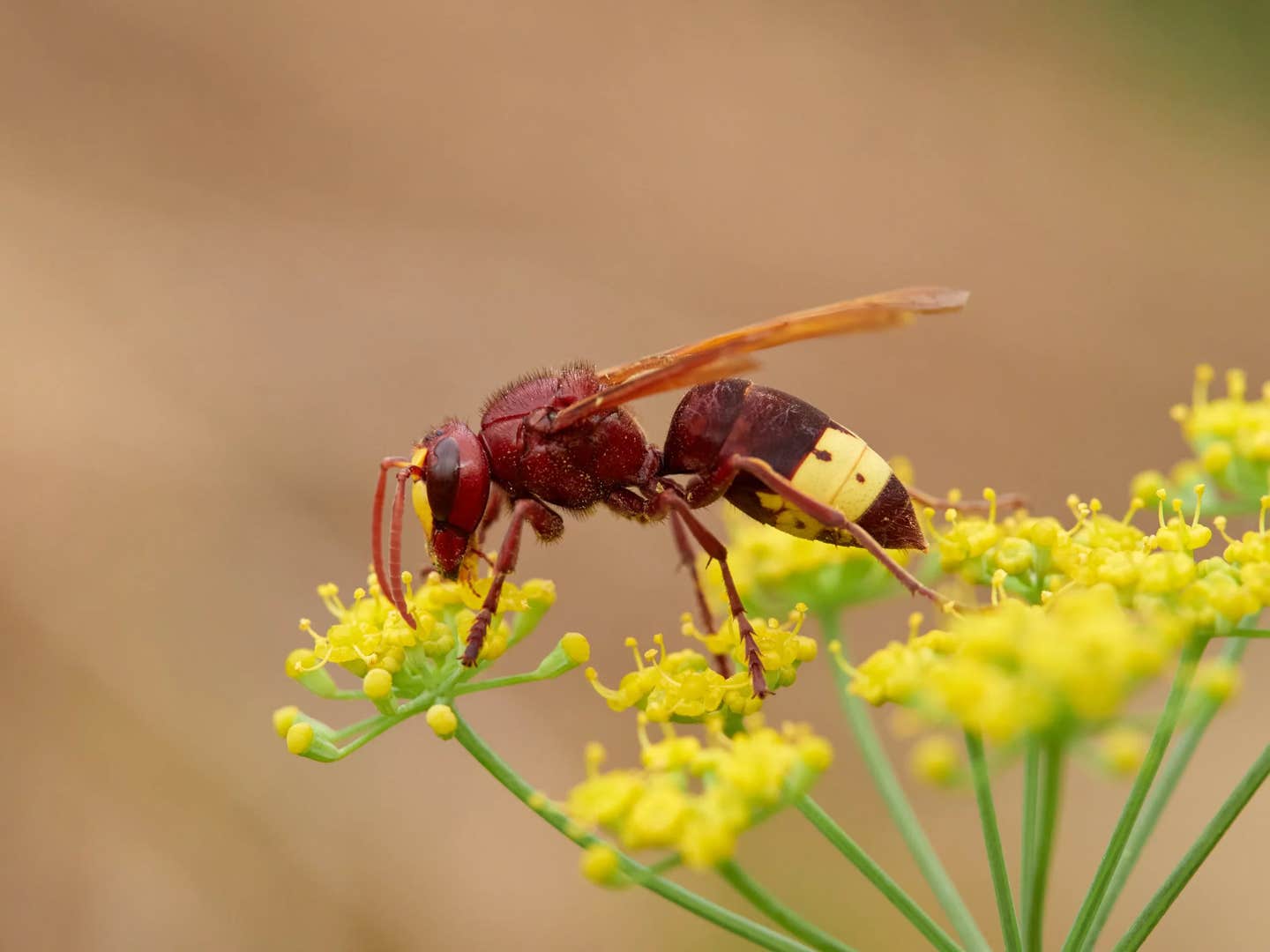Hornets can consume unlimited amounts of alcohol without ever getting ‘buzzed’
The Oriental hornet can consume high levels of alcohol with no health effects, hinting at potential breakthroughs in alcohol tolerance.

Oriental hornets can tolerate high alcohol levels without health impacts. (CREDIT: CC BY-SA 3.0)
A recent study from Tel Aviv University (TAU) unveils a surprising biological feat of the Oriental hornet: it appears to be the only animal capable of consistently consuming high levels of alcohol without compromising its health or lifespan.
This research, led by Dr. Sofia Bouchebti in the lab of Professor Eran Levin at TAU’s School of Zoology and Steinhardt Museum of Natural History, reveals insights that may hold the key to understanding alcohol metabolism and resilience to intoxication.
Published in Proceedings of the National Academy of Sciences (PNAS), this study opens a new chapter in alcohol research by studying a creature that thrives where other species would suffer.
Alcohol is a common byproduct in nature, resulting from the fermentation of sugars by yeasts and bacteria, particularly in ripe fruits and nectar. While alcohol offers nearly double the energy content of sugar, it is toxic to most animals, including humans, especially when consumed chronically.
For millennia, humans have shown a unique tolerance and even enjoyment of alcohol, dating back to the domestication of the wine grape approximately 10,000 years ago. Despite this partial tolerance, excessive alcohol use has clear effects on human health and behavior, contributing to diseases, impaired cognition, and changes in mood and physical coordination.
The Oriental hornet, however, appears exempt from the usual toxic effects of alcohol. “This is a remarkable animal that shows no signs of intoxication or illness even after ingesting huge amounts of alcohol,” notes the research team.
Related Stories
Unlike humans and other animals, the Oriental hornet naturally stores yeasts in its digestive system. This symbiotic relationship allows yeast to thrive and produce alcohol internally, which the hornet then consumes and metabolizes efficiently. “One explanation is that hornets transfer yeasts to fruits, indirectly contributing to the production of wine,” Dr. Bouchebti says, illustrating the hornet’s unique biological process.
In the study, the researchers tested the hornets' alcohol metabolism by tagging ingested alcohol with a heavy carbon isotope. As the hornets metabolized the alcohol, it broke down into carbon dioxide, which was exhaled. By measuring the level of labeled carbon dioxide emitted, the team determined the speed at which the hornets processed alcohol.
“The findings were very surprising; we were amazed to see the rapid rate at which the hornets metabolized the alcohol,” says Dr. Bouchebti.
Curious if this tolerance to alcohol extended to their behavior, the researchers tested whether alcohol consumption affected the hornets’ aggression, social interactions, or nest-building skills. Even when provided an 80 percent alcohol solution as their sole food source, the hornets showed no visible change in behavior, a finding that astonished the team.
Normally, in most species, high concentrations of alcohol disrupt physical coordination, prompt aggression, or even induce lethargy. Yet, the Oriental hornet remained unaffected, exhibiting the same patterns of behavior as those consuming regular sugar water.
Lastly, the researchers analyzed the impact of alcohol on the hornet’s lifespan. Oriental hornets typically live around three months. The team set out to see if alcohol consumption might shorten this lifespan. To their amazement, no difference was found between hornets that drank only alcohol and those that consumed sugar water.
Professor Levin reflects on this discovery: “To the best of our knowledge, Oriental hornets are the only animal in nature adapted to consuming alcohol as a metabolic fuel. They show no signs of intoxication or illness, even after chronically consuming huge amounts of alcohol, and they eliminate it from their bodies very quickly.”
Alcohol’s role in human society has been extensively researched, with global statistics linking 5.3 percent of all deaths worldwide to alcohol consumption. This new study suggests that the Oriental hornet’s unique biology could serve as a model for further alcohol-related research, offering clues for developing treatments or prevention strategies for alcohol dependence and abuse.
“We believe that, following our research, Oriental hornets could potentially be used to develop new models for studying alcoholism and the metabolism of alcohol,” concludes Levin, emphasizing the potential scientific applications of this hornet’s natural resilience to alcohol.
This study sheds light on how one species has adapted to use alcohol as a safe and efficient energy source, raising intriguing questions about how such a mechanism might be used or studied in other biological contexts.
The Oriental hornet, unbothered by what would be lethal amounts for most creatures, might one day inspire new directions in medical and biological research, challenging existing assumptions about alcohol metabolism and tolerance.
Note: Materials provided above by The Brighter Side of News. Content may be edited for style and length.
Like these kind of feel good stories? Get The Brighter Side of News' newsletter.
Joshua Shavit
Science & Technology Writer | AI and Robotics Reporter
Joshua Shavit is a Los Angeles-based science and technology writer with a passion for exploring the breakthroughs shaping the future. As a contributor to The Brighter Side of News, he focuses on positive and transformative advancements in AI, technology, physics, engineering, robotics and space science. Joshua is currently working towards a Bachelor of Science in Business Administration at the University of California, Berkeley. He combines his academic background with a talent for storytelling, making complex scientific discoveries engaging and accessible. His work highlights the innovators behind the ideas, bringing readers closer to the people driving progress.



